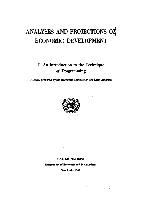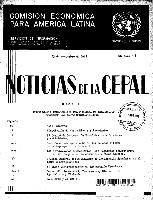- Biblioteca CEPAL
- Biblioguias
- ILPES_en
- Planning for development in the 60 years of ILPES
- Origins and creation of ILPES
Planning for development in the 60 years of ILPES
Origins and creation of ILPES
Initially intended to implement the resources of the Marshall Plan for post-World War II recovery through support to countries in development planning and programming, with the creation of ILPES, an important school of thought in economic and social planning was founded in Latin America and the Caribbean. ILPES was established within the context of the Alliance for Progress and the need to develop specialized capacities for economic and social development planning in the region's countries. In effect, Resolution 199 (IX) of 13 May 1961 of the Commission on the formation of the Institute states the importance of economic programming and the urgency of its use to stimulate and ensure the accelerated development of the region. The creation of ILPES was officialised by Resolution 218 (AC.50) and Resolution 220 (AC.52) of the ECLAC Committee of the Whole at its Ninth Session in 1962. This Latin American school of economic and social development planning was formed within the framework of ECLAC's thought of the same period on industrialization and the reforms needed to deepen and consolidate it in the region.
The creation of ILPES has at least three important historical precedents within the work of ECLAC:
 The first was the leadership of Raúl Prebisch as Executive Secretary of ECLAC between 1950 and 1963 and the development of dependency theory and the structuralism school of thought: he promoted the creation of a planning institute for Latin America, and then became the first director of ILPES until 1973.
The first was the leadership of Raúl Prebisch as Executive Secretary of ECLAC between 1950 and 1963 and the development of dependency theory and the structuralism school of thought: he promoted the creation of a planning institute for Latin America, and then became the first director of ILPES until 1973.
The second were the courses aimed at training technical staff of Latin American countries (since 1952, the Training Program in Problems of Economic Development), organized around three fundamental questions that will continue to be relevant in training for development planning during the following decades: How to make a situational diagnostic of a country? What are appropriate programming techniques? And, how to organize development planning?
The third were the advisory groups that worked from ECLAC at the request of Latin American governments in development planning and project evaluation, to prepare realistic development plans that could attract productive investment. These groups drafted the first country plans and programs and promoted changes in national budgetary systems to convert them into a mechanism for planning public investment and spending.
Featured publications
-
 Theoretical and practical problems of economic growth
by
Publication Date: 1952Período de Sesiones 4 México 28 mayo-16 junio 1951
Theoretical and practical problems of economic growth
by
Publication Date: 1952Período de Sesiones 4 México 28 mayo-16 junio 1951 -
 Introduction to the technique of programming
Call Number: E/CN.12/363Publication Date: 1955Serie Análisis y Proyecciones del Desarrollo Económico Vol. 1.
Introduction to the technique of programming
Call Number: E/CN.12/363Publication Date: 1955Serie Análisis y Proyecciones del Desarrollo Económico Vol. 1.
-
 Noticias de la CEPAL Año VIII N° 6
Publication Date: 1962Reseña los alcances y antecedentes de la creación del ILPES.
Noticias de la CEPAL Año VIII N° 6
Publication Date: 1962Reseña los alcances y antecedentes de la creación del ILPES. -
 La invención del ILPES
by
Publication Date: 2013
La invención del ILPES
by
Publication Date: 2013
